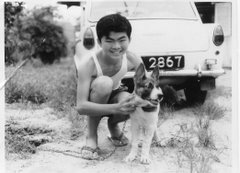It was reported in today’s Straits Times that tunneling works for the construction of the Downtown Line had caused cracks to appear in the walls of the Ying Fo Fui Kun building at Telok Ayer Street; a building which was gazetted for preservation as a national monument under the Preservation of Monuments Act in 1998.
 |
| Mr Yong's (at age 13) graduation certificate |
I was unable to find out much information about
this school until, by a stroke of luck, I stumbled upon an article in an old
book that I happened to possess. The book was The Straits Time Bilingual
Collection, Vol 1, which I bought in 1982. In it was an article written by Tan
Ban Huat entitled, Mandarin becomes the
lingua franca of the Chinese here (华语学校,源远流长). The article traced the teaching of Mandarin in
Singapore up to the time of the Japanese Occupation; and ended with these
words:
“The Japanese Occupation of Singapore saw the temporary setback of Chinese education. However, during the post-war period, Chinese schools mushroomed and by the 1950s, Mandarin had become the lingua franca of the Chinese-educated. By the same token those who could not converse in it were considered uneducated!”
 |
| Yin Sin - one of the earliest schools to teach Mandarin |









2 comments:
It is only sensible to conserve old historical buildings for posterity as part of our heritage. However, they have to be kept in good condition and therefore sufficient fund should be allocated for renovation purposes. As a timely reminder, a few day ago, the ceiling of an old british theatre came crashing down during a show, injuring quite a few people. After a disaster happens, it is useless to resort to a 'blaming game' of who are to be responsible.
Yes,the Association also houses a "school" within the premises during the early days. In fact the class rooms are on the left side of the building,(when entering the hall) and there are 2 or 3 class rooms.
there used to be a "five foot way" next (left of the association)to the building, and you can hear the teacher's voice when walking along the covered Five foot way in the day, because the classrooms are just next to the five foot way, and there were air vents connecting the class rooms and the five foot way.
In those days, it was simply referred to as 应新学校 (or 应新学堂 in Hokkien), because it was more a school than a clan association.
I happened to live just 2 shop houses away. along Cross Street.
The school also has a "sports filed" directly across the street, from the school, that is directly opposite the school. The school and the sports filed are both on two sides of the junction of Telok Ayer and Cross street. One of the special features of the sports field is that it has a basketball court and has few very old Banyan Tree within the sports field.
A landmark along Cross Street, in those days.
Post a Comment